My father was a very big man. And he wore a black moustache. When he grew older and it grew grey, he coloured it with a pencil. The kind women use. Mascara. English couple Mary (Natasha Richardson) and Colin (Rupert Everett) are taking a return holiday in Venice in an attempt to repair their relationship. They are befriended by suave Robert (Christopher Walken), a British-Italian bar proprietor, unaware that he has been stalking and photographing them. When he brings them to his palazzo apartment and introduces them to his wife Caroline (Helen Mirren) they become enmeshed in a game of psychological and erotic roleplay and wind up experiencing a terrifying drama of decadence in which nothing and nobody is as they appear … I mean that you’d do absolutely anything for the other person, and you’d let them do absolutely anything to you. Anything. Adapted by Harold Pinter from the 1981 Ian McEwan novella, this picturesque exploration of perverse relationships practically wallows in morbidity. Teetering on the verge of horror and luridness at all times, this never tips into typical genre expectations, always erring on the side of suggestiveness, surprise and eerieness. Until a swift end is brought to proceedings. The irony replete in the story is all in the title and in creepy Walken who declares, They want to destroy everything that’s good between men and women. It’s expertly directed by Paul Schrader with densely beautiful cinematography by Dante Spinotti, permitting the full strangeness of the city to express the moistly malevolent mystery, sinister and lustrous, terrifying and thrilling, all at once, inhabited by just the right performers in wondrous sets by Gianni Quaranta. Some people don’t like the ending. As in life, etc. Although if you’ve read Thomas Mann or seen Don’t Look Now you’ll have a justifiably familiar feeling of foreboding. A sensual nightmare of innocents abroad. I knew that fantasy was passing into reality. Have you ever experienced that? It’s like stepping into a mirror
Category Archives: Homosexuality
Sunday Bloody Sunday (1971)
There is no whole thing. You have to make it work. Divorced thirtysomething recruitment agent Alex Greville (Glenda Jackson) begins a romantic relationship with glamorous sculptor Bob Elkin (Murray Head), aware that he’s also intimately involved with lonely middle-aged Jewish doctor Daniel Hirsh (Peter Finch). Bob takes off from the weekend babysitting for Alex’s friends the Hodsons (Vivian Pickles and Frank Windsor) in order to spend time with Daniel. The younger man represents a break with the pasts of both Bob’s older lovers, and neither is willing to let go of the love and vitality he brings to their mundane lives although he’s planning to leave for New York … I know you’re not getting enough of me but you’re getting all there is. Film critic Penelope Gilliatt’s screenplay, suggested by material she plumbed in her novel One by One, is a deep delve into the compromises and deceptions people make in order to have a little happiness. The North London setting with its population of slightly boho middle class types conceals the fact that the story is told rather cleverly, through the shared answering service, tales that Daniel is told by his patients, the insights of the precocious children Alex is minding and her mother’s truisms about marriage. The autumnal scenes carving out a season of political unrest hint at the melancholy truth that these are people who live in fear of rejection, hesitant about commitment, afraid to make a permanent display of emotion in a film which wears its protagonists’ pathology on its shirt sleeve, a patina of loss. It’s amusing to see both Alex and Daniel cruise past Bob’s flat late at night, fearful there might be yet another person claiming his affection. Alongside the brilliant performances of the leads, with Finch a standout, there’s legendary silent actress Bessie Love as an answering service operator; Tony Britton in search of a job and winding up with a one night stand; and a very young Daniel Day-Lewis as a car vandal. How apposite for Jon Finch to be hustling his namesake, narrowly avoiding a late night arrest in Piccadilly Circus. Directed by John Schlesinger, whose best film this is, about a world he fully inhabits. He also contributed to the screenplay for this landmark in gay representation, along with David Sherwin and Ken Levison, who are thanked for their assistance in the credits. Some people believe something is better than nothing, but I’m beginning to believe that nothing can be better than something
Victor/Victoria (1982)
Only a moron gives advice to a horse’s arse. Paris, 1934. Coloratura soprano Victoria Grant (Dame Julie Andrews) fails in her audition at a nightclub where she’s seen by gay cabaret singer Carole “Toddy” Todd (Robert Preston) who has been fired from his gig at a second-rate Chez Lui. When Victoria punches out Toddy’s bisexual hustler lover Richard (Malcolm Jamieson), Toddy comes up with what he considers to be an inspired idea: to pass Victoria off as a female impersonator. Victoria. Her male alter ego could be the toast of Paris and make a lot of money as gay Polish Count Victor Grazinski. It all goes well until Chicago gangster King Marchan (James Garner) turns up with his girlfriend Norma Cassady (Lesley Ann Warren) and falls for Victor, convinced he is a she … A woman pretending to be a man pretending to be a woman. A breathtaking blend of musical comedy, gender confusion, romance, slapstick, cross-dressing and cabaret, this loose remake of 1933 German screwball film Viktor Und Viktoria written by Hans Hoemburg and director Reinhold Schuenzel is a showcase for all writer/director Blake Edwards’ talents as well as providing wife Julie Andrews’ greatest role. Preston is a joy as her outrageous gay mentor in a warm, funny, generous performance and Garner has great fun subtly unravelling when his suspicions are proved happily correct in a scenario that takes pleasure in mocking his macho stance. Warren is also excellent as his Thirties moll with bodyguard Alex Karras surprising everyone by coming out. And for Edwards fans there’s the prospect of Graham Stark providing his customary support in a cast alight with provocation and tolerance proving sexual orientation really is not the issue as long as you’re getting some. What great characters! With songs by Leslie Bricusse and composer Henry Mancini there’s a lot to love in an astonishingly constructed entertainment. Never mind twist endings, the entire narrative is twisted in every possible direction. A modern classic. People believe what they see
Ordinary Love (2019)
How do you say to someone, Don’t die? Joan (Lesley Manville) and Tom (Liam Neeson) Thompson are a happy, long-married couple who enjoy a quiet life until she discovers a mass in her breast and makes an appointment to see a doctor who confirms she has a lump. When it is removed along with many lymph nodes she then proceeds to have chemotherapy. Her recovery is difficult and painful and she befriends the terminally ill teacher Peter (David Wilmot) of her late daughter. Her hair falls out, her temper frays and she and Tom have a major argument when she is at a low point and taunt each other. They have a nice night together and make love before her double mastectomy. After Peter’s death they prepare for Christmas and decide to invite Peter’s boyfriend to join them … Putting sick people together: how is that going to make anybody feel better? Even a marriage of kindness and vulnerability can hit a rocky patch. Facing up to a cancer diagnosis can bring out the worst in anyone, even briefly. Asking tough questions of a doctor when it’s not your illness makes you the rude guy; likening your bystander role to that of the person being mutilated and burned in operating theatres and treatment rooms makes you intolerable. For a while. This is also a story about bereavement and a Sixties Modernist house empty of personal touches because a child died, we’re not sure when. Even the goldfish dies. Death is contagious, it seems. And in the midst of that atmosphere somehow a marriage of true friends carries on, through hospital appointments, surgeries, horrific medical solutions and the deaths of other people in the ward. Manville and Neeson are tremendous in a subtle piece of writing by Owen McCafferty. Directed by Lisa Barros D’Sa and Glenn Leyburn and filmed in Northern Ireland, with a score co-written by producer David Holmes. A triumph of intimacy, in the best sense. You’d rather be worse than better
Play Misty for Me (1971)
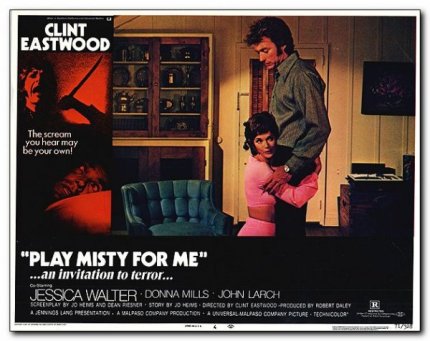
You ever find yourself being completely smothered by somebody? Popular late night radio show host Dave Garver (Clint Eastwood) at jazz station KRML becomes restless in his relationship with artist girlfriend Tobie Williams (Donna Mills). Impulsively, he goes out and has a one night stand with Evelyn Draper (Jessica Walter) a woman he meets at a nightclub. Afterwards he finds out she was not an anonymous hookup, but an obsessive fan who has been calling in repeatedly to request he play the Errol Garner song Misty. Garver soon discovers extricating himself from Evelyn will be no easy feat as she insinuates herself into his life, showing up everywhere and becoming increasingly deranged. He seeks help from policeman Sgt McCallum (John Larch) only realising at the eleventh hour that Tobie may be in danger... Do you know your nostrils flare out into little wings when you’re mad? It’s kinda cute. Eastwood made his directing debut with trusted mentor Don Siegel by his side and playing Murphy the bartender at a local joint in the town where he lived, Carmel-by-the-Sea in Northern California, a locale made look even more beautiful by the skilled cinematography of usual Eastwood DoP Bruce Surtees. The screenplay was written by Jo Heims, a former model and dancer, while Dean Riesner (from Dirty Harry and Coogan’s Bluff) polished it; with the idea for a girlfriend, Tobie, coming from editor Sonia Chernus. It’s a clever and lean premise, brilliantly executed in the economic style we have come to know as Eastwood’s particular stamp. He uses his local knowledge to establish a keen sense of place, with a variety of shots giving us a good idea of the geography of this stunning town, the gorgeous sunlight steadily accreting to create a form of terror all over Monterey County. The tension is marvellously sustained with expert use of the jazz soundtrack (and the local music festival) creating more suspense with Roberta Flack’s The First Time Ever I Saw Your Face used for a romantic mood. (The song’s exposure turned it into a Number One hit.) Walter was Eastwood’s first choice for Evelyn following her appearance in The Group a half dozen years earlier, and we believe her to be so much of a threat that she can do absolutely anything to impose her will; while Mills acquits herself very well as the only stable character in this unwitting love triangle. She had played opposite Burt Reynolds in an episode of his show Dan August and he recommended her to Eastwood. He looked at rushes and hired her without even meeting her. Eastwood is excellent here, completely believable as a man of a certain age who is selfish and unaware and still thinks he can hit it big in the city yet has to bide his time reading poetry late at night to a devoted small town audience. A great first film. I did it because I LOVE YOU!
Zee and Co. (1972)
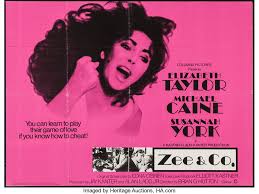
Aka X, Y and Zee. Quite frankly, Scarlett, I don’t give a shit! Middle-aged London architect Robert Blakeley’s (Michael Caine) angry wife Zee (Elizabeth Taylor) finally gets even with him for his affair with young widowed boutique owner Stella (Susannah York) by first attempting suicide and then having a go at seducing the woman herself. And Stella’s past threatens to engulf them all … Come back here, you! I haven’t dismissed you yet! This is Irish novelist Edna O’Brien’s first original screenplay and it was published in advance of the film’s release, with some evident alterations to the source material. Worth watching as an incredible time capsule of the ageing Swinging London set hiccoughing their way into the new decade and with gems of performances from the cast. Taylor’s flamboyant bisexual complete with Cleopatra makeup flames into violence when provoked by her sly puss of a husband, recalling the best moments of Who’s Afraid of Virginia Woolf? in this raunchy iteration of the woman scorned. She’s dressed horribly, matched only by fag hag Gladys (Margaret Leighton in an astonishing pink frightwig) who shows up in a gold see-through number. Caine excels as the man who finds himself cuckolded by his victim and goes off the rails pondering whether it’s possible men have nervous breakdowns, chastened by reminders of his wideboy background; while York gets to have another tilt at the kind of plaything part from The Killing of Sister George but with a taint of something else – as she says, I’m sick of serenity. It often tips into camp particularly in the with-it party scenes but there’s a truth about the relationships that shears through the trashy affect and all three rise to meet the perversity that haunts them. It’s nicely shot around London by Billy Williams and there’s a sharp score by Stanley Myers which acknowledges the slide back and forth from uxorious romance to self-parody. Look out for a young Michael Cashman as Gavin, York’s design assistant. Filled with sex and spite, this is highly entertaining. Directed by Brian G. Hutton, if you can believe it, in a total change of pace from Where Eagles Dare and Kelly’s Heroes. But of course! I think I know what she is. She practically told me herself
The Eiger Sanction (1975)
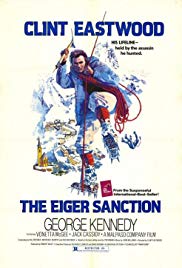
Why am I the only one that can perform the sanction? Art professor and collector Dr. Jonathan Hemlock (Clint Eastwood) a retired assassin for C2 a secret Government organisation run by albino Dragon (Thayer David), is blackmailed into returning to his deadly profession and do one more ‘sanction,’ a euphemism for killing. Duped by C2 operative Jemima Brown (Vonetta McGee), he agrees to join an international climbing team in Switzerland planning an ascent north face of the Eiger Mountain in order to complete a second sanction to avenge the murder of old friend, Wormwood aka Henri Baq who fought with him in the Green Berets back in Indochina. He trains with another friend from his climbing days, Ben Bowman (George Kennedy) who runs a school in the desert where another Indochina ally, flamboyant gay hit man Miles Mellough (Jack Cassidy) turns up and tries to kill Hemlock. Ben is leading the Eiger team and when Hemlock is tracking the killer, he finds himself on a treacherous mountain passage, unable to identify his target … You’re getting religion a little late. A barmy enterprise for Clint Eastwood to star in and direct but not without its consolations – a deal of wit; awesome photography (by Frank Stanley) of the locations in Monument Valley, the southwest and Switzerland; and terrific characterisation – but that all depends on caricature, homophobia and race stereotyping typical of the era. So it goes in a text that was fatally misunderstood: the novel on which it was based by the pseudonymous ‘Trevanian’ was a spoof – and in a later book he called it ‘vapid’ in a footnote! Eastwood did his own stunts, training for months and it is actually astonishing to see a star of his magnitude defying death at such extreme heights. One of the experienced mountaineers employed on the team wasn’t so fortunate: British climber David Knowles died on the second day of filming in what was a very dangerous shoot. It’s good to see Kennedy and Eastwood working together again after Thunderbolt and Lightfoot and the romance with blaxploitation star McGee is certainly progressive but it’s Cassidy as the unbelievably dangerous cissy who steals the show in an unforgettable performance. Adapted by Trevanian (actually film scholar Rodney Whitaker) and mystery novelist Warren Murphy. Wish-fulfilment writ large, this is a lot of stylish fun. Here’s to the selfish killer and patriotic whore
Bad Education (2019)
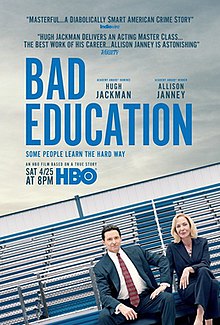
You were always the guy in the suits. Long Island, New York, 2002. Dr. Frank Tassone (Hugh Jackman) is the superintendent of Roslyn School District which oversees Roslyn High School. Frank, along with his assistant superintendent Pam Gluckin (Allison Janney) have overseen major improvements in the district, with Roslyn becoming the 4th ranked public school in the country under their watch. This in turn stimulates the local economy, reaping rewards for school board head and real estate broker Bob Spicer (Ray Romano). Frank is beloved by students and parents alike, and sought after by women; Frank claims to have lost his wife several years ago, but is in fact gay, living with Tom Tuggiero (Stephen Spinella) in NYC. While attending a conference in Las Vegas, Frank begins an affair with former student Kyle Contreras (Rafeal Casal) who has given up his dream of writing sci fi for waiting tables and dancing. While writing an article for the Roslyn school paper about an $8m sky bridge the school is planning to construct, student reporter Rachel Bhargava (Geraldine Viswanathan) begins to discover discrepancies in the district’s finances. Unbeknownst to anyone at the school, Frank and Pam are co-conspirators in a massive embezzlement scheme that has cost millions of taxpayer dollars and her steady research leads all the way to the top and when Frank gives up Pam there will be hell to pay ... We come in here at the crack of dawn because we’re good people. We want you to have a good life. Adapted from Bad Superintendent, a story by Robert Kolker in New York magazine by Mike Makowsky, who was a middle school student in that school district when Tassone was arrested for grand larceny. Viswanathan isn’t a particularly interesting performer but she does what all journalists have done since watching All the President’s Men – she follows the money. It’s dogged old-school reporting stuff, looking at purchase orders, not finding receipts and then questioning everyone concerned. It’s fun to see those moments with her doubtful student paper editor Nick Fleischman (Alex Wolff) doing a junior Ben Bradlee. The moment one hour in where she finds the so-called offices of the school’s pamphlet producer and realises it’s Tassone’s plush apartment where he’s co-habiting with a man is brilliantly done – capped when Tassone arrives and sees her desperate to leave the building. Jackman is superb as a charismatic man with many secrets, utilising his ability to psychoanalyse everyone around him to get the better of them since he seems to care so much about them. For the longest time we don’t even know the extent of his involvement as information is drip fed slowly through the narrative. His vanity is reflected in the scenes with him attending to his cosmetic routine, culminating in surgery. Jackman finds ways to plumb the breadth of the character and elicit empathy, stealing our hearts as easily as expensing first class flights to London with his boyfriend and deflecting come-ons from women in the parents’ association book club. Janney is superb in a chewy role – able to talk her way out of trouble, trying to buy her children’s affections even when her son is a total loser and ultimately choosing the path of revenge. Erring more on the dramatic rather than the comedic side of genre, this gives a rare insight into white collar crime – the quotidian corruption that afflicts cosy cartels running public bodies leading to those occasional stupefying headlines when you see something has gone bust yet all the admin people are living high on the hog while their workplaces are falling apart with damp. The sidebars about food intake, digestive issues, cosmetics, clothes, jewellery, pushy parenting and spoiling wrong ‘uns are well judged subplots amplifying the drudgery of the teaching environment and the desire to rise above the mere plebs. It’s wordy, it’s smart, it’s filled with people covering their asses and it’s called the ring of truth. Directed by Cory Finley. I am not the sociopath here
Road to Perdition (2002)

Where would this town be without Mr John Rooney? In 1931 Michael Sullivan (Tom Hanks) is a hitman and enforcer for Irish-American mob boss John Rooney (Paul Newman) in the Rock Island area. His son Michael Jr. (Tyler Hoechlin) hides in the car one night after the wake for one of Rooney’s henchmen and sees his Connor Rooney (Daniel Craig) administer a shot in the head to the dead man’s brother Finn (Ciarán Hinds) who talked too much at the event; while he understands for the first time what his father does for a living when he witnesses the bloodshed. Rooney sends Connor to kill Michael and the boy but Connor instead kills his wife Annie (Jennifer Jason Leigh) and other son Peter (Liam Aiken) in cold blood and Michael goes on the run with Michael Jr in an attempt to gain revenge for his family’s murder. He finds that he has no friends and no protection and is advised by Mafia man Frank Nitti (Stanley Tucci) to give up. He reckons without a freelance corpse photographer Maguire (Jude Law) following him and thinks that by uncovering Connor’s theft that Rooney will accept him as the son he never had … A man of honour always pays his debts and keeps his word. I like this far better now that years have passed, Newman is gone and what I originally thought of as directorial heavy-handedness is more readily recognisable as a comfort with the excessive expressionistic qualities of the source material. Hanks’ doughy face with its deep-set eyes seems peculiarly unsuited for this kind of role but paradoxically lends the performance an unexpected quality. His six-week road trip with his son gives him an opportunity to impart lessons and learn about the boy for the first time. He makes us know that Michael Jr is not to follow him into this deadly business. His scenes with Newman are marvellous – a kind of trading off in acting styles, one legend passing on lessons to the next, borne out in the storytelling. What Michael doesn’t know is that blood means more than sympathy, no matter the horrors involved in being part of the Rooney family. Of course Connor would betray his father; and of course his father knows. It’s a hard thing to watch Michael learn the truth. Loyalty sucks. This is a gallery of masculine roles – Craig as the ever-smiling psychotic son, Law as the rotten-toothed shooter masquerading as the photographer of death – a correlative of the film’s own morbidity; Hoechlin as the boy learning at his father’s elbow as the guns go off. Hinds impresses in those early scenes, quietly seething then mouthing off at his brother’s wake, a crime which will not go unpunished. Dylan Baker’s accountant Alexander Rance has a decidedly old-fashioned homosexual taint of prissiness. This is a linear story of fathers and sons, cause and effect, crime, punishment and revenge in an Oedipal setting dictated by the rules of inevitability that can be traced to Greek tragedy. There are no surprises but the pleasures of the production design by Dennis Gassner, the cinematography by Conrad Hall (who earned a posthumous Academy Award) and the performances make this worth a re-viewing. Screenplay by David Self from the graphic novel by Max Allan Collins and Richard Piers Rayner. Natural law. Sons are put on this earth to trouble their fathers
Mr Jones (2019)
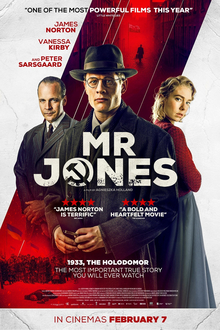
The Soviets have built more in five years than our Government has in ten. In 1933, Gareth Jones (James Norton) is an ambitious young Welsh journalist who has gained renown for his interview with Adolf Hitler. Thanks to his connections to Britain’s former Prime Minister, David Lloyd George (Kenneth Cranham), he is able to get official permission to travel to the Soviet Union. Jones intends to try and interview Stalin and find out more about the Soviet Union’s economic expansion and its apparently successful five-year development plan. Jones is restricted to Moscow where he encounters Pulitzer Prize-winning New York Times Moscow bureau chief Walter Duranty (Peter Sarsgaard) a libertine who sticks to the Communist Party line. He befriends and romances German journalist Ada Brooks (Vanessa Kirby) who reluctantly sees him follow the path of murdered journalist Kleb in pursuit of a story. He jumps his train and travels unofficially to Ukraine to discover evidence of the Holodomor (famine) including empty villages, starving people, cannibalism, and the enforced collection of grain exported out of the region while millions die. He escapes with his life because Duranty bargains for it on condition he report nothing but lies. On his return to the UK he struggles to get the true story taken seriously and is forced to return home to Wales in ignominy … They are killing us. Millions. Framed by the writing of Animal Farm after a credulous commie-admiring Eric Blair aka George Orwell (Joseph Mawle) expresses disbelief that Stalin is anything but a good guy, this is an oddly diffident telling of a shocking true story that’s art-directed within an inch of its life. Introducing Orwell feels like a disservice to Jones. Norton has a difficult job because the screenplay by Andrea Chalupa is too mannerly and the film’s aesthetic betrays his intent. Director Agnieszka Holland is a fine filmmaker but the colour grading, the great lighting (there’s even a red night sky shot from below as Jones and Brooks walk through Moscow) and the excessive use of handheld shooting to express Jones’ inner turmoil somehow detracts from the original fake news story. It happens three times during food scenes including when he realises he’s eating some kids’ older brother. Shocking but somehow not surprising and amazingly relevant given the present state of totalitarian things, everywhere, in a world where Presidents express the wish to have journalists executed and some of them succeed. Some things never change. Chilling. I have no expectations. I just have questions



